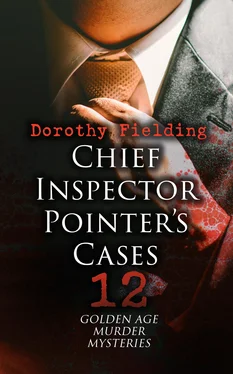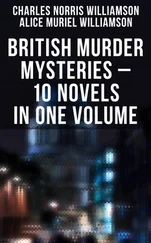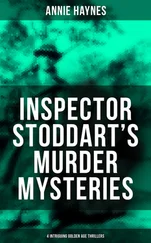"Do you give a fair exchange-rate?" She spoke a little wistfully.
He acknowledged the hit with a laugh. A laugh of sympathy; he was very sorry for Barbara.
"I'll give you full value. Speaking plainly, Miss Ash, I want to find out something definite from Mrs. Tangye's past. Nothing in the least to her discredit, but I want to reconstruct her life. Before she married Branscombe." Barbara's eyes widened. But she was one of the very few people who, when they have nothing to say, say nothing.
"You see," he was not looking at her, but at a fine old stag who paced towards them with ideas of apples, "some people might think there was a good, sound, probable motive for a murder already to hand. But I want to make sure that there isn't a better, sounder, more probable one still, to be got. It's tremendously true that the strongest motive wins, you know."
There was a long silence. The stag walked huffily off. Pointer felt that something was stirring in Barbara, was welling up within her. But after a moment she said quietly, "Surely you know everything there is to know about Mrs. Tangye's past. I've just been talking to my grandfather. He says that the worst thing against Mr. Vardon is that he was seen near Riverview late on Tuesday afternoon. Is that the case? I mean, is that a very important thing against him?"
"Very," Pointer admitted, still not looking at her.
"Of course, if any one else had been seen on Tuesday near Riverview between four and six, it would make a great deal of difference. But as it is Mr. Vardon seems the only one. That—taken into consideration with other things—does look very serious."
They were across Richmond Bridge by now. Barbara said good-bye abruptly. The short winter day was almost over when Pointer turned back. Stray leaves touched his cheek with cold little fingers as they fell. The lights of a barge drawn up to be mended shone red like the eyes of the Great Sea Serpent, who had found a refuge at last. Pale winter moths floated past. The moths that some old folk say are the spirits of the dead. They vanished, or were palely seen, as they drifted now through darkness, now through the rays of a lamp. They were too much like the underlying facts of Mrs. Tangye's death, he thought, to be pleasant company for a detective officer.
Pointer had purposely given himself plenty of time before turning in at Twickenham police court. He was not surprised to find Barbara Ash being politely entertained by Haviland. The Superintendent was showing her his stamp collection, knowing that her grandfather owned a notable one.
"There's something very fascinating about stamps," Haviland was saying as Pointer hung up his hat. "Nothing uncertain about them. I always liked geography at school. History no. There's no proving half of what they tell you in history. But in geography, if they say a town or river is in a certain place, you can go and find out for yourself. You can prove it, as a matter of fact. Even if you don't do it, you know you could go and look. Or dig..."
Pointer seemed just sufficiently surprised to see Barbara again so soon. She flinched a little, as she looked up at him. Then she took a seat further from the light.
"I've something very important to say," Barbara was pale beneath her tan, "I suppose I should have told you before, but I didn't realise—things—until our talk just now. My grandfather doesn't know I'm here," she added, with a quaintly reassuring voice.
"And that's a good thing, too," Haviland thought. Barbara paused for a moment.
"I—I was afraid he might think it unwise—what I am going to say."
Pointer thought this highly likely. Only tell the police what they already know, was Dorset Steele's motto. Barbara drew a deep breath. She went paler yet.
"Mr. Tangye is supposed to've been in town until after six. At least so my grandfather tells me—"
The two officials nodded.
"Yet I saw him coming out of Riverview's side gate, the tradesman's gate, just a few minutes after the churches around struck half past five."
"Where exactly were you?"
"I was at the corner before you get to the house, coming up from the river. It's a place where some hollies hang far over the road."
"What did Mr. Tangye do?"
"He opened the gate very carefully, and very slowly, and closed it, after standing as though listening for a second, very quickly behind him. Then he jumped into his car, and was off. I don't think he saw me."
"Was the engine running?"
"I think so."
"Had he anything in his hand?"
"Yes; a package of some sort."
Pointer nodded towards some shelves.
"Could you pick out a book of about the size of the package you saw in his hand?"
Barbara picked up an A.B.C. and a Continental Bradshaw. She thought that the box in Tangye's hand was about the thickness of the latter and the general size of the former. Could it have been a camera? Pointer asked. Barbara thought that it looked not unlike a large box-camera.
"He came out so oddly. So noiselessly," she repeated, "He opened the gate without making a sound. And he looked up and down the garden path before closing it."
"He looked towards the house?"
Barbara nodded. There was a short silence.
"And you yourself, Miss Ash, how did you come to be so close to Riverview?"
"Oh, I merely happened to be passing," she said awkwardly. "You can go to our house from the Richmond links either around by Riverview or through the Deer Park."
Pointer sat quite still. His eyes on his pen point for once. He had not expected this. He really had thought this girl a fine, honest, creature. Was she too to come within the circle of those tainted suspects of his? Oh, the pity of it!
Barbara spoke again. Impulsively, in a rush. This time in her natural voice. A voice that suggested all things young, and frank, and fair. "I—I take that back. I mean, that wasn't truthful," she broke off in great distress.
Pointer came to her aid.
"You're trying to tell us, aren't you," he said very kindly, "that you were the visitor whom the maid mistook for Mrs. Cranburn? At least that's what we've thought for some time."
Pointer had at least suspected as much since his visit to her father. Barbara fitted in with so many points of the case. Florence might easily have mistaken a bundled-up figure for that of a stout woman. And the voice of a girl with a cold for a wheezy voice. Barbara looked both relieved, and a little appalled.
"I'm glad you know," she said quietly, "I would have spoken at once only I was afraid—after you detained Mr. Vardon, that you might think there was some connection—on his part I mean, because it was me. Florence didn't recognise me. She had only seen me once."
So Barbara, too, thought that Vardon might be guilty. Or else she would have come forward at once. Her explanation held good for the time since Vardon was under police observation, but from the first she must have suspected him.
"You were calling on Mrs. Tangye?" Pointer asked pleasantly. "I think you can depend on us, Miss Ash, not to misunderstand."
Wilmot, who had dropped in to ask a question of Haviland, took a seat after a glance of permission from Barbara.
"Just a friendly call, I suppose?" Wilmot asked.
"No," she sat with her eyes on her gloved hands, obviously suffering. "No; not quite that. Not unfriendly, of course. I wanted to see if I couldn't get Mrs. Tangye to do something for Mr. Vardon. After that talk on the links," she glanced at Pointer, "I, too, was rather stirred up, and wondered whether she, a comparatively wealthy woman, might not be induced to give Mr. Vardon at least a hearing. He has a perfectly sound proposition to lay before any one. But she wouldn't let him even tell her of it."
"Had you ever broached the subject with Mrs. Tangye before?" Pointer asked.
Читать дальше












